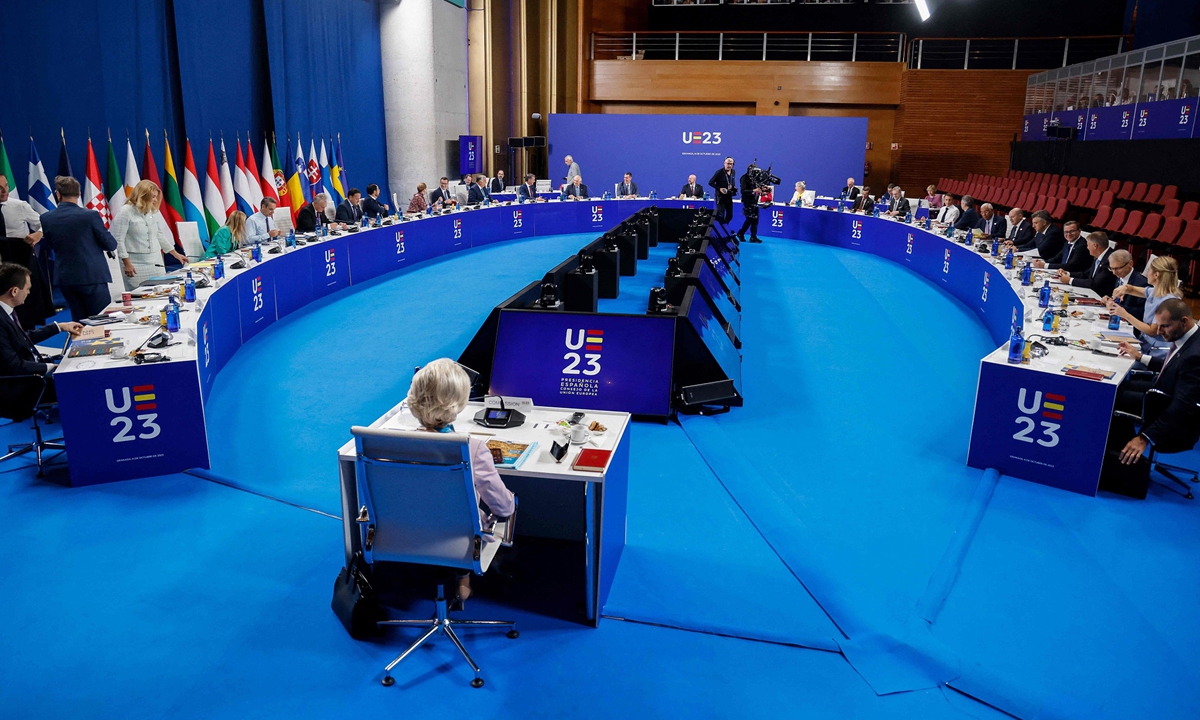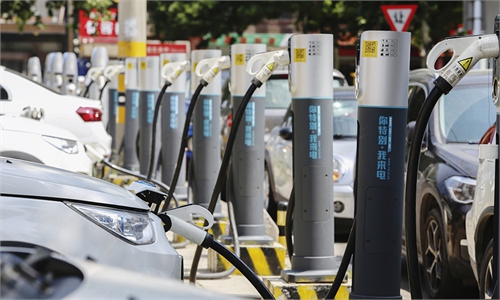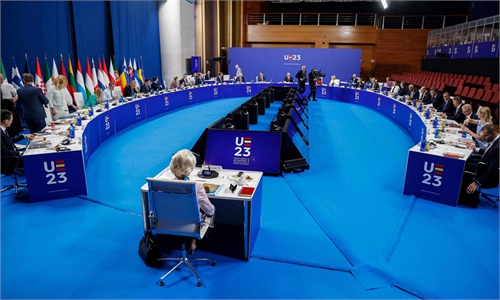To ‘counter coercion,’ EU must first recognize ‘real coercion’: Global Times editorial

European Heads of state take part in a plenary session during the European Council Informal Meeting in Granada, southern Spain on October 6, 2023. Photo: VCG
The European Union (EU) Summit opened on October 6, with the strategy of "de-risking" and ensuring economic security remaining as key topics of discussion. Just three days ago, the European Parliament passed the long-awaited "Anti-Coercion Instrument" (ACI) with an absolute majority vote. Although the act does not explicitly name any country, European public opinion widely points it to China, as if this act was specifically designed to deal with China.
According to the publicly available text of the ACI, the act is aimed at all countries that have or intend to take "coercive" measures, meaning it targets actions rather than countries. Let's assume this claim is true, and that at least European lawmakers are well aware that targeting countries rather than actions is inappropriate and unacceptable.
The EU's desire to champion the cause of "anti-coercion" is not a problem. If it is genuinely about countering coercion, the Chinese people understand and firmly support it. As a victim of trade bullying, China is undoubtedly the world's primary victim. In terms of safeguarding trade liberalization and opposing trade bullying, China and the EU can and should be partners in Europe's anti-coercion efforts. China and the EU not only share a common language and common interests in the face of economic coercion from the US, but they can also take joint actions. It is worth mentioning that the initial intention of the ACI was for Europe to respond to economic bullying by the Trump administration, and this starting point should not be forgotten.
Objectively speaking, the EU is indeed one of the victims of the recent wave of anti-globalization. In 2018, Donald Trump wielded the steel and aluminum tariff stick, and in 2022, the Biden administration passed the "Inflation Reduction Act." In recent years, the US pressured the EU to ban Huawei and ZTE's 5G equipment, and block Netherlands' exports of photolithography and chip-making technology to China, etc. The EU has been on the losing end in all these situations. Former Deputy National Security Advisor Charles Kupperman even warned that they would make it impossible for Netherlands lithography machine giant ASML's equipment to operate. If we talk about "economic coercion," this is its most blatant form.
After the birth of the ACI, it is unfortunate that so many people in Europe believe it is aimed at China. It must be said that this has seriously deviated from its original purpose. If the EU follows Washington's lead and uses this act as a tool to engage in coercion under the guise of "anti-coercion," China will firmly oppose it regardless of the target. If the EU uses it to impose illegal unilateral sanctions on China, it will undoubtedly face strong countermeasures from China.
During the National Day holidays, the EU opened an anti-subsidy probe into Chinese electric vehicles and published a preliminary list of critical technologies. Now with ACI, the trade protectionism involved in these actions will undoubtedly harm the interests of European companies and people and affect the EU's image as a proponent of free trade. Many intelligent Europeans are already gravely concerned.
The two examples most commonly cited by European anti-China politicians as so-called "coercion" are Lithuania and the Netherlands. These two examples are indeed very typical, but the facts are exactly the opposite of what they claimed as they have omitted or distorted the causes and consequences of the two cases. It is well known that it was Lithuania's political provocation that came first, and China's legitimate response followed. When it comes to issues involving China's core interests, no one should expect China to compromise or swallow its grievances. Moreover, China's actions are legitimate countermeasures in the field of diplomacy, which has nothing to do with "coercion" at all. As for the Netherlands, the question is whether it faces countermeasures from China or coercion from the US to restrict its export of semiconductor production equipment to China. There is no need to say more about the answer.
The Chairman of the Committee on International Trade of the European Parliament, Bernd Lange, compared the ACI to "a tiger with teeth" and a "gun." If this act can truly be used to uphold international trade order and justice, we would welcome it targeting "real coercion" in international trade and becoming a "real gun" to deter trade bullying behaviors.


